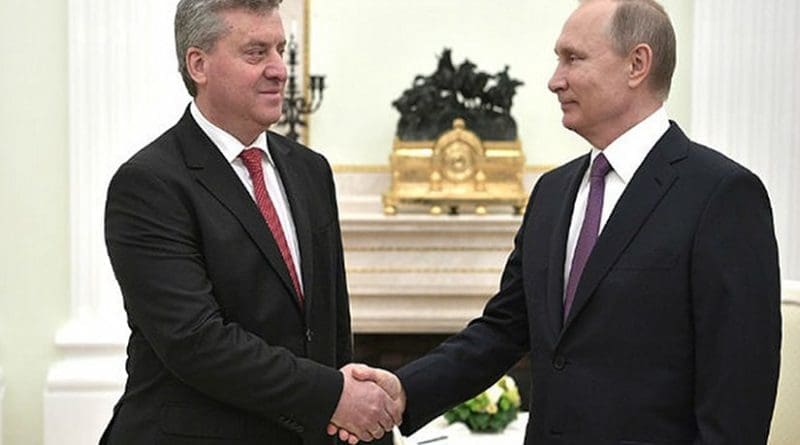Putin’s Homage To Cyrillic Makes Bulgarians See Red
By Mariya Cheresheva
Vladimir Putin’s claim, made at a meeting with the Macedonian President, that the Slavic alphabet came to Russia from Macedonia, has not gone down well in Bulgaria.
А number of Bulgarian ministers and diplomats have condemned Russian President Vladimir Putin for telling his Macedonian colleague George Ivanov on May 24 – the Day of Slavic Literacy – that the Cyrillic script came from Macedonia.
“The Slavic alphabet and literature came to us from Macedonian soil”, Putin told Ivanov during the Macedonian President’s visit to Moscow.
In response, Ivanov paid a tribute to the Slavic educators and saints, the brothers Cyril and Methodius, founders of the Glagolitic alphabet, which served as a basis for Cyrillic, who are “our spiritual teachers”.
Bulgaria, which also celebrated the Day of Bulgarian Education, Culture and the Slavonic Alphabet on Tuesday, disagreed with this reading of history.
“The creation of literacy happened due to the will, and participation, of the Bulgarian state and it is hardly a coincidence that the Bulgarian ruler Boris I is present in all ancient Bulgarian books as Boris-Mihail – the Baptizer, who introduced the faith and literacy,” Bulgarian Foreign Minister Ekaterinaa Zahaieva wrote on Facebook on Wednesday.
“This is not only our holiday, and the Cyrillic script is shared. But it has to be known that we remember our history and we are proud of it,” Zaharieva added.
Bulgaria’s Deputy Prime Minister and Defence Minister, Krasimir Karakachanov – a nationalist and the author of several books on Macedonia, a land which Bulgarians nationalists have long laid claim to, also accused Putin of misinterpeting history.
“I am surprised that the President of the largest Slavic country is not familiar with the history of the Slavic nations. Russia, which talks about Slavonity, and about Orthodoxy, does not know history,” Karakachanov told NOVA TV on Thursday.
Bulgaria’s Prime Minister Boyko Borissov was milder in his reaction, merely telling reporters on Wednesday that arguing about the distant past to establish “who came from where to bring the alphabet” was is not a “European approach”.
“The European way is to say that thanks to Holy brothers Cyril and Methodius … that nearly 300 million [people] read and write [Cyrillic] and enrich European culture,” Borissov said.
Ilian Vassilev, a former Bulgarian ambassador to Moscow, accused Putin of “playing with Serbia and Macedonia” in order to increase pressure on Sofia.
“When Putin talks about history in this way, this means current politics which lays on the Russian imperial traditions,” he wrote for Bulgaria Analytica.
Bulgaria’s ex-ambassador to Macedonia also expressed anger on Facebook, calling Putin’s statement “a provocation against Bulgaria”.
The Cyrillic script, which dates from the 9th century AD, is used across parts of Eastern Europe and North and Central Asia. It is generally, or very widely, used in Serbia, Macedonia, Montenegro, Bulgaria, the Serb entity in Bosnia, Russia, Ukraine, Belarus – as well as by the large Russian diaspora in other former Soviet republics.
Bulgaria developed early Cyrillic on the basis of Cyril and Methodius’s Glagolitic alphabet during the first Bulgarian state in the 9th century AD, shortly after the population was baptized under Boris I.


the Bulgarian speaking Slavs of fyrom are suffering the side effects of antiquization. deluded in all ways. Bulgarian is what they speak. they are ethnic Bulgarians who want to be something more.
At the time of Cyril and Methodius who created the Glagolitic alphabet and their disciples (Clement, Naum who created the Cyrillic alphabet in Bulgaria on the order of its Tsar, Boris I), the word Macedonia did not designate anything in South-West Bulgaria (as a region around the town of Ohrid, in particular). At that time, there was a piece of land (a Byzantium thema/district) under the name Macedonia but it was around (mainly to the south of) the town of Adrianopolis. This is modern-day Odrin (Edrine in Turkish). Today, it is in Turkey. Hence, if a Russian, e.g. Putin, says that the Cyrillic alphabet has come to Russia from Macedonian soil, envisaging the countries which exist now, this may as well mean that the Turks gave this alphabet to the Russians.